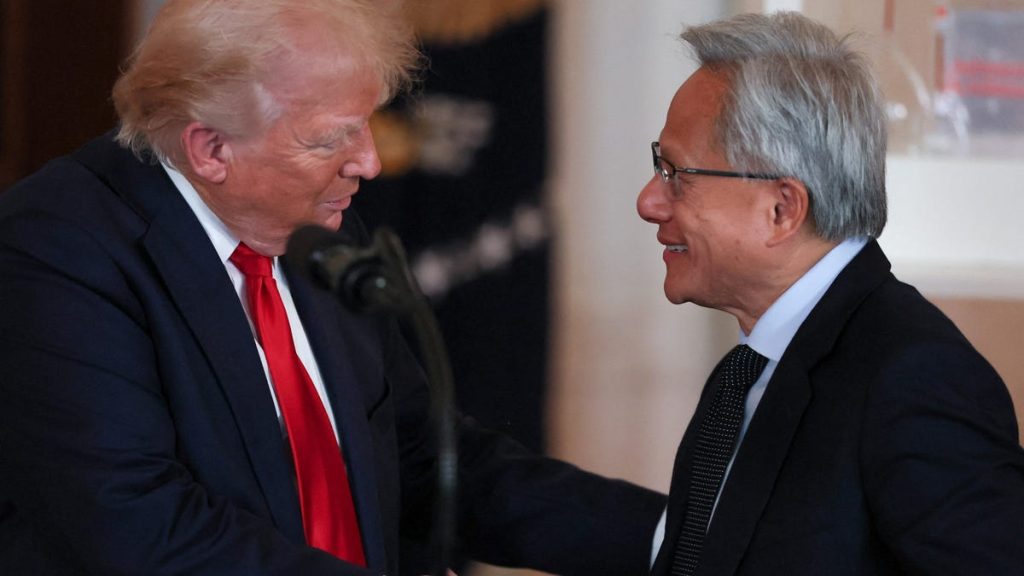
Foxconn plans huge Taiwan AI data center with Nvidia
Taiwan’s Foxconn, the world’s largest contract electronics maker, said on May 20 that an artificial intelligence center it announced with Nvidia will be built in phases and is targeted to have 100 megawatts of power.
Even as Nvidia reported another blockbuster quarter of 69% sales growth on Wednesday, the maker of artificial intelligence chips warned of more emerging risks to its business due to the technology conflict between the U.S. and China.
Tucked into Nvidia’s quarterly filing with U.S. securities regulators, Nvidia for the first time said restrictions on the use of open-source AI models from China such as DeepSeek and Qwen could hurt its business, as could U.S. rules barring connected-vehicle technology from China, where Nvidia’s long-struggling car chip business has finally flourished.
While Nvidia CEO Jensen Huang on a conference call with analysts praised U.S. President Donald Trump’s decision to rescind an export rule put in place by former President Joe Biden that would have regulated the flow of Nvidia’s chips around the world, the company’s quarterly filing noted that no new rule had been issued in its place and that a “replacement rule may impose new restrictions on our products or operations”.
On the other hand, Huang criticized new export curbs imposed by the Trump administration in April. The curbs stop the company from selling its H20 chip made for the Chinese market, which Huang called “a springboard to global success”.
The export limits cost Nvidia $2.5 billion in sales during its just-ended fiscal first quarter, and it expects another $8 billion sales hit during the current fiscal second quarter. The company reported $4.6 billion in revenue from H20 sales in China as customers stockpiled the chips before the curbs set in, with the China business accounting for 12.5% of overall revenue.
“The question is not whether China will have AI – it already does. The question is whether one of the world’s largest AI markets will run on American platforms,” Huang said, later adding that “AI export controls should strengthen U.S. platforms, not drive half of the world’s AI talent to rivals.”
Huang also argued that keeping Chinese open-source models such as DeepSeek and Qwen running on Nvidia chips provides U.S. firms with valuable insight on where the global AI industry is headed.
“U.S. platforms must remain the preferred platform for open-source AI,” he said. “That means supporting collaboration with top developers globally, including in China. America wins when models like DeepSeek and Qwen run best on American infrastructure.”
Republican and Democratic senators Jim Banks and Elizabeth Warren sent a letter to Huang on Wednesday raising national security concerns about Nvidia’s plans to open a research and development facility in Shanghai.
They also asked the company to provide a timeline and description of its plans for the proposed facility.
Nvidia is “simply leasing a new space for existing employees, who need the room in the post-COVID return to work. The scope of work will remain unchanged,” a company spokesperson said.
Sales growth powers on
Nvidia shares rose 4% on Thursday as news that a U.S. trade court blocked most of Trump’s proposed tariffs also boosted investor sentiment. The company will add around $130 billion to its market value of about $3.289 trillion, if the gains hold.
Despite the China export curbs, Nvidia forecast sales of $45 billion, plus or minus 2%, in the second quarter, only slightly below analysts’ average estimate of $45.90 billion, according to data compiled by LSEG. That would imply growth of about 50% from a year earlier.
Company executives also highlighted deals worth potentially billions of dollars in the coming months and years in Saudi Arabia, the United Arab Emirates and Taiwan, leading analysts to conclude the impact of U.S.-China trade tensions was not as bad as feared.
“Rather than downplay the China hit, (Huang) contextualized it as a known, manageable speed bump in an otherwise hyper-accelerated growth narrative,” said Michael Ashley Schulman, chief investment officer of Running Point Capital.
In his praise for Trump, Huang highlighted the president’s deal-filled tour of the Middle East.
“Trump wants U.S. tech to lead,” Huang said. “The deals he announced are wins for America, creating jobs, advancing infrastructure, generating tax revenue and reducing the U.S. trade deficit.”
Huang also said that he agreed with a vision expressed by cabinet officials such as Commerce Secretary Howard Lutnick of bringing factories back to the United States and staffing them with robots.
“Future plants will be highly computerized in robotics. We share this vision,” Huang said.
Reporting by Stephen Nellis in San Francisco; Additional reporting by Arsheeya Bajwa and Jaspreet Singh in Bengaluru; Editing by Sayantani Ghosh, Sonali Paul and Shounak Dasgupta

